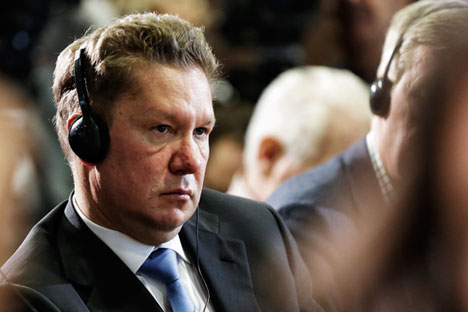
Gazprom CEO Alexei Miller. Source: AP
The Nezavisimaya Gazeta newspaper writes that gas negotiations between the European Commission, Russia and Ukraine in Berlin have concluded in Gazprom's favor. Moscow has welcomed the intermediate results of the tripartite talks with great optimism. Citing the Russian Energy Ministry, the newspaper says that Kiev has agreed to pay back more than $3 billion in loans and advance payments for future supplies for a price of $385 per 1,000 cubic meters of gas.
"However, it is still too early to celebrate, since the conditions must now be confirmed at a governmental level," underlines Nezavisimaya Gazeta. However, the terms of compromise that Russian Energy Minister Alexander Novak reports contradict Ukrainian Naftogaz's demands: The newspaper reminds its readers that Kiev had earlier demanded for the price of Russian gas to be set according to European gas exchanges.
The final decisions will be made after consultations between the governments of Russia and Ukraine. The new meeting, writes Nezavisimaya, will take place this week. Russian experts suspect that the negotiation's progress may be "complicated by Ukrainian Prime Minister Arseny Yatsenyuk's American advisors." Many experts also believe that Kiev has a sufficiently strong negotiating position.
The newspaper says that it is Europe and Gazprom who are mostly interested in expediting the signing of the new agreements. Kiev, if it so wishes, can delay the negotiations for a long period, since Ukraine has accumulated enough gas to make it through the winter, with difficulty, but without Russian supplies. Europe, on the other hand, is afraid of freezing due to the Russian-Ukrainian conflict and is therefore pressing for the contracts to be signed as soon as possible. Meanwhile, Gazprom, according to one of Nezavisimaya Gazeta's writers, is afraid to lose its reputation as a dependable supplier this winter. "Therefore Moscow may be interested in regulating the gas situation even more than Kiev," he says.
The Kommersant newspaper reports that the ceasefire agreement in the Donbass region of eastern Ukraine has been in effect for more than three weeks, but neither of the sides has actually ceased firing. The situation that appears most tense, according to the newspaper, is near Donetsk, in Debaltsevo, on the way to Mariupol. On top of it all, only a few weeks are left until the beginning of the heating season, while the infrastructure in the Donbass has suffered greatly due to the war. Kommersant writes that the leadership of the self-proclaimed Lugansk People's Republic is preparing for the winter and is trying to find a way to change the region's gas routes in order to receive gas from Russia.
The newspaper's sources say that technically, Kiev can cancel gas supplies to the disputed territories if, for example, consumers in these regions refuse to pay for them. Moreover, experts say that the infrastructure in the combat zone is in a pitiable state. Donetsk and Lugansk are independent from Kiev only as far as electricity is concerned, writes Kommersant, noting that the territory that the militias control has many generators. Yet part of the energy network remains damaged as a result of the war.
"Another problem with Ukraine's energy is the catastrophic ruin of the networks," writes the newspaper. "It will be difficult to repair the enterprises and infrastructure; the region is still not ready for the heating season."
The Vzglyad newspaper reports on the discovery of a fourth mass burial site containing the bodies “of peaceful civilians” near the town of Nizhnya Krynka. "The town of Nizhnya Krynka will go down in the history of the war in the Donbass as a symbol of mass executions," writes the newspaper. OSCE observers have already arrived at the location. Vzglyad reminds its readers that the Russian Foreign Ministry has described the execution of civilians in the Donbass as a war crime. "In the opinion of the Russian government, these people were massacred, which is proven by their hands being tied behind their backs and traces of shots to the head," notes the newspaper. The Ukrainian side denies all accusations related to the bodies discovered in Nizhnya Krynka.
Vzglyad also reports the announcement made by Russian Foreign Minister Sergei Lavrov on Russian television: "Peace has begun in Ukraine."
The newspaper also reminds its readers that in an earlier interview with Bloomberg TV, Lavrov emphasized that Moscow does not intend to comply with Washington's demands for the sake of removing the sanctions. "First and foremost, we are thinking about the Ukrainian people," said Lavrov. "We will do everything in our power to help implement the Minsk agreements and reach a full state of regulation."
Citing Lavrov's words, Vzglyad writes that Russia and the U.S. will need a "Reset 2.0." Moscow is interested in the normalization of relations with Washington, especially now, when peace is developing in Ukraine.
All rights reserved by Rossiyskaya Gazeta.
Subscribe
to our newsletter!
Get the week's best stories straight to your inbox